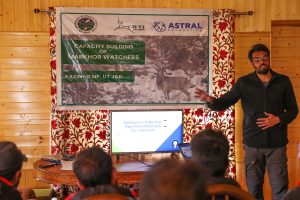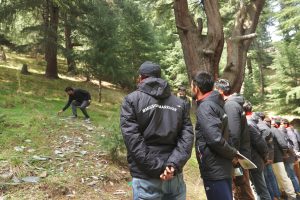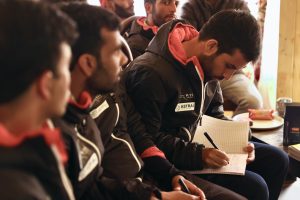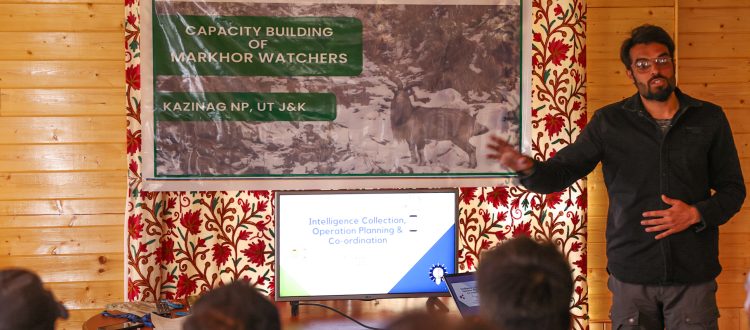Training and capacity building for Markhor watcher groups
In the overarching landscape of Kazinag National Park, resides the world’s largest mountain goat, Kashmir or Pir Panjal Markhor (Capra falconeri cashmiriensis), a near threatened species, who is listed in schedule (1) species under Wildlife (Protection) Act (1972). These Protected Areas (PA) in recent times, have been affected by uncontrolled large-scale grazing and threats of poaching of this charismatic wild goat. This has caused a disastrous impact on the habitat and population of Markhor in the state of Jammu and Kashmir. To reduce these threats in the area, Wildlife Trust of India (WTI) in partnership with Department of Wildlife Protection Jammu & Kashmir (UT) and with support from Astral Foundation, conducted one-day capacity building workshop. The purpose was to train and boost the morale of the Markhor watchers at the Nature Interpretation Centre, Limber Wildlife Sanctuary
Markhor watchers were introduced to important facets of identifying hoof marks, scats, pellets and how to the use GPS devices on the field. The group was educated on wildlife crime prevention practices such as anti-poaching patrolling techniques, intelligence gathering, informer network and handling.

The workshop was inaugurated by Mr. Maqbool Baba, Wildlife Warden North and Range officer of Baramulla, Mr. Altaf Kaul. The first session was taken by Dr. Marifatul Haq, field officer (WTI), who briefed the Markhor watcher group about the proper methods of evidence collection and documentation. This was followed by a practical interactive training session where they learned about various challenges along with proper use of the GPS devices. Next session was by Mr. Mohammad Maqbool Baba, Wildlife Warden North, on building informer network and tracking relevant information, which helps in facilitating anti- poaching activities.
While boosting the morale of the Markhor watchers during his session, Mr. Maqbool Baba stressed the importance of intelligence network in curbing the Markhor wildlife crime and urged the team to be a step ahead of the poachers. He was of the view that such capacity building workshops, should be continued to equip and boost the morale of the Markhor watcher group for its effective sustainability.

Mohd. Aslam Khan, one of the participants, found the session of immense use which helped him gain detailed knowledge about anti-poaching activities and efficient outcomes.
The workshop was evaluated through a pre and post-test on the training module. WTI found an increase of knowledge of 30% amongst the participants with about 90% of the trainees indicating that the training cum-workshop was very innovative and relevant to their work. A Markhor watcher WhatsApp group was also formed to share and update information generated from the field and related discussions. The team is motivated and have made a resolve to be a constant watcher group of Kazinag National park, an important habitat for Markhor.

The workshop was attended by Mohammad Maqbool baba (wildlife warden North Kazinag), Mr. Altaf Kaul (Range Officer (wildlife), Baramulla Range), Mr. Riyaz Ahmad (Block Forest officer, Limber WLS), Dr. Marifatul Haq (Field officer WTI), and Sameer Khazir (Field Officer, WTI) and Moomin John (Field officer, WTI).









